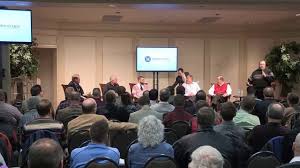Religion is declining in its influence in America according to nearly three quarters of those surveyed in a recent Pew Research poll, and most of those thought that was a bad thing.
Nearly half of those surveyed indicated that churches and houses of worship should express their views on social and political issues, and a growing number, though still a minority, think churches should endorse candidates for political office. Those who were affiliated with a church were more supportive of politicians talking more about religion.
 One person on a FOX News team summed up this report by saying, “People today are scared.” I don’t know if that is the motivation behind the views of those surveyed, but it is consistent with what happens when we get scared.
One person on a FOX News team summed up this report by saying, “People today are scared.” I don’t know if that is the motivation behind the views of those surveyed, but it is consistent with what happens when we get scared.
When we get scared, we don’t want information. We want comfort, assurance, and guidance. We turn to the people we already trust, and we disbelieve the people we are already skeptical of. Of course, this leaves us wide open to the biases of those we trust and we miss the wisdom of those who have a different opinion.
Fortunately, many religious leaders stay informed of political and social issues and can help their congregations address the issues and fears from a broad perspective. However, many other religious leaders approach the issues from a strict doctrinal perspective or their own personal bias. Too often then, people are simply told what to think, do, or believe.
As a seminary student, one of my biggest disappointments was being taught what to think about particular issues and what to believe about scripture and doctrine. I was not taught how to think about those things. I was not encouraged to ask critical questions nor to look at issues from a variety of Biblical perspectives or historical perspective or even through the lens of my own personal perspective, all of which should play into any commitment or statement of belief. In short, I was taught to be a good Baptist, not a good thinker.
 Should churches and ministers address social and political issues? Absolutely. But they should do so not by instructing people on what to think or how to respond to a particular issue, but rather by encouraging people to think fully and clearly about issues, and by providing them opportunities to discuss those issues thoroughly.
Should churches and ministers address social and political issues? Absolutely. But they should do so not by instructing people on what to think or how to respond to a particular issue, but rather by encouraging people to think fully and clearly about issues, and by providing them opportunities to discuss those issues thoroughly.
Church leadership and congregations should have the goal of helping one another to carefully and prayerfully consider all sides of an issue, to discuss with and listen openly to those who have different experiences and perspectives, to consider the many individuals who are affected, and to filter our responses through Jesus’ example of compassion and inclusion. We should be encouraged to ask all the questions we can of each other and of our leaders, because it is in the questions and the discussion that truth is found. Not in declarations.
Wanting our political leaders to talk about religious things is a steeper slippery slope. Our elected officials don’t have to have an ounce of religious conviction or spiritual guidance in order to invoke the name of God in their speeches. Yet, we Christians tend to believe and follow the ones who do use God language, regardless of their motivation, and we distrust those who don’t.
If elected officials are going to invoke the name of God in their speeches, we should ask what they mean by that. The third commandment has nothing to do with cursing. It has everything to do with using God’s name to curry the favor of others for one’s own agenda.
These research trends appear to stand in contradiction to the constitutional right we know as “the separation of church and state.” If Christians choose to blur those lines, we must at least be well informed, listen respectfully to those whose views are different, and be open to taking a position that follows Jesus’ example but may contradict the views of the institutional church.
An open heart and open mind have a way of doing that.
0 Comments until now
Add your Comment!